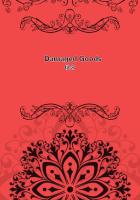Much of Sara Lee's life at home had faded.She seemed to be two people.One was the girl who had knitted the afghan for Anna, and had hidden it away from Uncle James' kind but curious eyes.And one was this present Sara Lee, living on the edge of eternity, and seeing men die or suffer horribly, not to gain anything - except perhaps some honorable advancement for their souls - but that there might be preserved, at any cost, the right of honest folk to labor in their fields, to love, to pray, and at last to sleep in the peace of God.
She had lost the past and she dared not look into the future.So she was living each day as it came, with its labor, its love, its prayers and at last its sleep.Even Harvey seemed remote and stern and bitter.She reread his letters often, but they were forced.And after a time she realized another quality in them.They were self-centered.It was his anxiety, his loneliness, his humiliation.Sara Lee's eyes were looking out, those days, over a suffering world.Harvey's eyes were turned in on himself.
She realized this, but she never formulated it, even to herself.What she did acknowledge was a growing fear of the reunion which must come sometime - that he was cherishing still further bitterness against that day, that he would say things that he would regret later.Sometimes the thought of that day came to her when she was doing a dressing, and her hands would tremble.
Henri had not returned when, the second day after Rene's death, the letter came which recalled her.She opened it eagerly.Though from Harvey there usually came at the best veiled reproach, the society had always sent its enthusiastic approval.
She read it twice before she understood, and it was only when she read Belle's letter again that she began to comprehend.She was recalled; and the recall was Harvey's work.
She was very close to hating him that day.He had never understood.She would go back to him, as she had promised; but always, all the rest oftheir lives, there would be this barrier between them.To the barrier of his bitterness would be added her own resentment.She could never even talk to him of her work, of those great days when in her small way she had felt herself a part of the machinery of mercy of the war.
Harvey had lost something out of Sara Lee's love for him.He had done it himself, madly, despairingly.She still loved him, she felt.Nothing could change that or her promise to him.But with that love there was something now of fear.And she felt, too, that after all the years she had known him she had not known him at all.The Harvey she had known was a tender and considerate man, soft-spoken, slow to wrath, always gentle.But the Harvey of his letters and of the recall was a stranger.
It was the result of her upbringing, probably, that she had no thought of revolt.Her tie to Harvey was a real tie.By her promise to him her life was no longer hers to order.It belonged to some one else, to be ordered for her.But, though she accepted, she was too clear a thinker not to resent.
When Henri returned, toward dawn of the following night, he did not come alone.Sara Lee, rising early, found two men in her kitchen - one of them Henri, who was ****** coffee, and a soldier in a gray-green uniform, with a bad bruise over one eye and a sulky face.His hands were tied, but otherwise he sat at ease, and Henri, having made the coffee, held a cup to his lips.
"It is good for the spirits, man," he said in German."Drink it."The German took it, first gingerly, then eagerly.Henri was in high good humor.
"See, I have brought you a gift!" he exclaimed on seeing Sara Lee."What shall we do with him? Send him to America? To show the appearance of the madmen of Europe?"The prisoner was only a boy, such a boy as Henri himself; but a peasant, and muscular.Beside his bulk Henri looked slim as a reed.Henri eyed him with a certain tolerant humor.
"He is young, and a Bavarian," he said."Other wise I should have killed him, for he fought hard.He has but just been called."There was another conference in the little house that morning, butHenri's prisoner could tell little.He had heard nothing of an advance.Further along the line it was said that there was much fighting.He sat there, pale and bewildered and very civil, and in the end his frightened politeness brought about a change in the attitude of the men who questioned him.Hate all Germans as they must, who had suffered so grossly, this boy was not of those who had outraged them.
They sent him on at last, and Sara Lee was free to tell Henri her news.But she had grown very wise as to Henri's moods, and she hesitated.A certain dissatisfaction had been growing in the boy for some time, a sense of hopelessness.Further along the spring had brought renewed activity to the Allied armies.Great movements were taking place.
But his own men stood in their trenches, or what passed for trenches, or lay on their hours of relief in such wretched quarters as could be found, still with no prospect of action.No great guns, drawn by heavy tractors, came down the roads toward the trenches by the sea.Steady bombarding, incessant sniping and no movement on either side - that was the Belgian Front during the first year of the war.Inaction, with that eating anxiety as to what was going on in the occupied territory, was the portion of the heroic small army that stretched from Nieuport to Dixmude.












